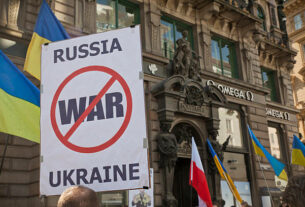The UK government and European commission have moved to avert a trade war over vaccines by pledging to “create a win-win situation and expand vaccine supply for all”.
A joint statement released this evening states: “We are all facing the same pandemic and the third wave makes cooperation between the EU and UK even more important.”
The vaccine row has been escalating as the UK’s roll-out continues apace with more than 50% of adults vaccinated compared to just 12% of adults in the EU, exacerbated by the emergence of a third wave of the virus.
‘Vaccine blockade would cause considerable economic damage ‘- Johnson
Earlier on Wednesday (March 24) Boris Johnson warned Europe will be the loser if the EU tries to impose a vaccine blockade on Britain, which would result in “considerable” and “long-term” economic damage.
Johnson’s comments followed Brussels’ move to empower officials to block vaccine shipments to countries with a higher vaccination rate among their populations – with the UK singled out for failing to export any doses to the EU. Under new plans, Brussels will require vaccine manufacturers to ask for permission to export doses.
The joint-statement marks a shift in tone and says: “We have been discussing what more we can do to ensure a reciprocally beneficial relationship between the UK and EU on Covid-19.
“Given our interdependencies, we are working on specific steps we can take – in the short-, medium – and long term – to create a win-win situation and expand vaccine supply for all our citizens.“
The UK and EU remind that “[I]n the end, openness and global cooperation of all countries will be key to finally overcome this pandemic and ensure better preparation for meeting future challenges,” and have pledged to “continue our discussions”
‘Interdependence’ – a word barley whispered since Brexit
The UK supplies raw materials for vaccines produced in the EU and member states and there are concerns an escalation in the row would see a vaccine ban to the UK disrupting vital supplies for the EU.
A senior EU diplomat, quoted in the Telegraph, said: “Retaliation is a lose-lose strategy, because we are not autarkic. The US cannot on its own produce the vaccines they need. Neither can the EU. Neither can the UK.”
Lionel Barber, the former editor of the Financial Times, said the most encouraging aspect of this evening’s UK-EU joint statement is the “recognition of interdependence – a word barely whispered in official circles since Brexit.”
Barber tweeted this is a “welcome shift from sovereignty waving” that was first “flagged by Johnson when he spoke of [a] third wave washing up on UK.”
‘Vaccines are the product of international co-operation,’ says PM
Earlier Johnson had told the Commons’ liaison committee – made up of the chair of the select committees – that the EU risked losing investment from foreign countries and business if it introduced a ban on exports to the UK, saying: “Vaccines, as you know, are the product of international co-operation.
“I don’t think that blockades of either vaccines or of ingredients for vaccines are sensible, and I think that the long-term damage done by blockades can be very considerable.
“I would just gently point out to anybody considering a blockade or an interruption of supply chains that companies may look at such actions and draw conclusions about whether or not it is sensible to make future investments in countries where arbitrary blockades are imposed.”
France on ‘red list’ could impact UK’s medicine and food supplies
Johnson also told the committee MPs that a decision might have to be taken “very soon” on the question of imposing tougher restrictions on travel from France to respond to fears about the spread of new Covid variants that may potentially be vaccine resistant.
The Labour party has called for tougher border measures and for France to be put on the “red list” of countries from which travel to the UK is currently banned. Johnson warned doing so would have an impact on the UK given 75% of medical supplies and 50% of food supplies arrive in Britain from France.
“People should be under no illusions that it would have consequences,” the prime minister told the committee.
“We will take a decision, no matter how tough, to interrupt that trade and to interrupt those flows if we think that it is necessary to protect public health and stop new variants coming in and it may be that we have to do that very soon.”
There are concerns about the spread of the South African, Brazilian and UK variants of the virus although French prime minister Jean Castex said at the weekend that the South African variant “did not appear to be advancing at all – in fact it is retreating”.




